Eyesight

Vitamins & Supplements for Eyes: Maintain & Improve Eye Health
Some vitamins and other micronutrients are associated with good eye health. While people often find it easier to take supplements, many experts recommend getting these nutrients from a healthy diet instead. If you do decide to take supplements, research the supplement and any associated health risks to make sure you don’t waste your money on […]
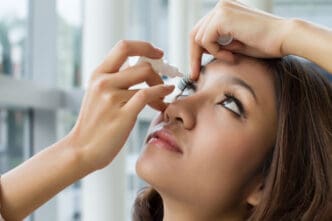
Antibacterial Eye Drops: Uses, Limitations & More
Antibacterial eye drops are used to treat bacterial eye infections, one of the most common eye health complications. Bacterial conjunctivitis, or pink eye, is especially common in children, where it can spread between hosts through a combination of poor hygiene and close proximity. What Are Antibiotic or Antibacterial Eye Drops? Antibiotic eye drops, also called […]

Flashing Lights in the Eyes (Photopsia): Causes & Treatment
Photopsias are visual flashes of light that come in many forms. The primary causes of photopsias are posterior vitreous detachment, retinal tears, and neovascular age-related macular degeneration. Treatment will depend on the particular conditions causing photopsia. What Do Photopsias Look Like? Photopsias are visual flashes, but this covers a wide range of similar yet distinct […]

Driving in the Rain: Dangers & Tips
While it’s sometimes necessary, driving in the rain is inherently more dangerous than driving under normal conditions. Visibility is reduced, and your car has a weaker grip on surfaces. Proceed with caution while driving in the rain. Reduce your speed, and get off the road if conditions make it unsafe to proceed. Dangers of Driving […]
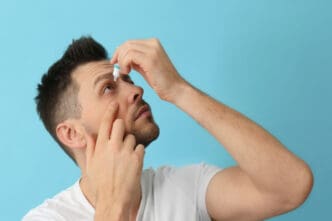
Allergy Eye Drops: Types, Best Brands & More
Allergy eye drops can provide relief from troubling allergy symptoms, such as eye redness, itchiness, and irritation. Eye-Related Allergy Symptoms According to the CDC, as many as 60 million people are affected by allergies in the United States each year. According to the Asthma & Allergy Network, 1 in 5 Americans are diagnosed with allergies, […]
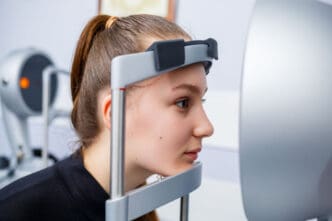
20-40 Vision: What Does It Mean?
People with 20/40 vision can’t see perfectly without glasses or contacts. But they may be able to do most things, including drive, without corrective lenses. If you have 20/40 vision, you’re not alone. Only about 35% of adults have normal, 20/20 vision without glasses, contacts, or eye surgery. But if you want to see things […]

20/100 Vision: What Does That Mean?
Having 20/100 vision means you must stand no more than 20 feet away from an object to see it clearly, while someone with normal vision can see it clearly from 100 feet away. 20/100 vision qualifies as having low vision, which needs eyeglasses to correct. Normal visual acuity is 20/20 vision, while 20/200 vision with […]

Contrast Sensitivity: Meaning, Testing, and Treatment
Contrast sensitivity is your eyes’ ability to identify an object not clearly defined from its background. It enables us to see well in different conditions, such as foggy or rainy days, and allows you to identify road signs when driving during the night. How Is Contrast Sensitivity Testing Useful? Contrast sensitivity testing can supplement other […]
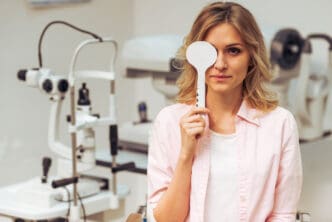
Visual Acuity: Meaning, Tests & Scores Explained
Visual acuity is the ability of your eyes to distinguish between objects that you see when standing at a specific distance. It is also called visual sharpness, or clarity of vision. Acuity is the first thing eye doctors assess when examining a patient because it gives a baseline of the person’s eyesight. Someone with normal […]

20/25 Vision: Is It Good or Bad
Having 20/25 vision means having eyesight that is considered just out of the normal range. Normal vision is called 20/20 vision. The numbers 20 and 25 mean that someone with this visual acuity must stand five feet closer to an object than someone with 20/20 vision does to see it clearly. People with 20/25 vision […]
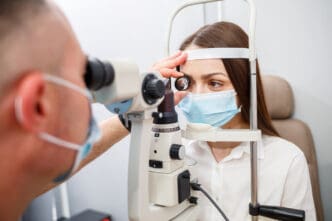
20/30 Vision: What Does It Mean and Do I Need Corrective Lenses?
If a doctor tests your eyes and the results say you have 20/30 vision, your vision is slightly worse than that of a person with normal eyesight (20/20). A person with 20/30 vision needs to move 10 feet closer to an object than someone with 20/20 sight. What Does 20/30 Vision Mean? A score like […]

20/20 Vision: Visual Acuity, Testing, and More
Someone with 20/20 vision is considered to have normal visual acuity, or normal eyesight. About 35 percent of adult Americans have 20/20 vision, which means they can see objects clearly when standing 20 feet away. 20/20 does not denote perfect vision, and there are other designations for people with better vision than 20/20. People with […]